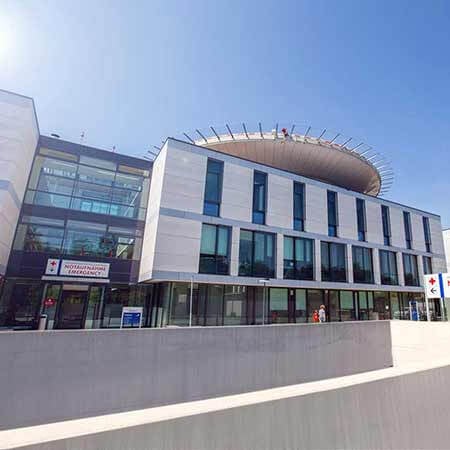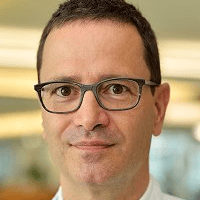Stereotactic Biopsy for Diagnosis of Brain Astrocytoma in the Best Hospitals in the World
Treatment prices are regulated by national law of the corresponding countries, but can also include additional hospital coefficients. In order to receive the individual cost calculation, please send us the request and medical records.

Department of Adult and Pediatric Neurosurgery, Spinal Surgery
The Department of Adult and Pediatric Neurosurgery, Spinal Surgery offers all the possibilities of modern surgical treatment for diseases of the central and peripheral nervous system in patients of all ages. More than 6,000 surgical procedures are performed annually in the department's high-tech operating rooms. Both planned and emergency neurosurgical procedures are performed here. The department's surgical team focuses on patients with cerebrovascular diseases, brain and skull base tumors, spine and spinal cord diseases, cerebrospinal fluid circulation disorders, and pathologies of the peripheral nervous system. The department's team of physicians also has extensive experience in functional neurosurgery: specialists perform deep brain stimulation for movement disorders, spinal cord stimulation for back pain, and vagus nerve stimulation for epilepsy. The department works closely with neurologists, radiologists, and nuclear medicine specialists to provide patients with the highest level of comprehensive medical care. The department is recognized as one of the top neurosurgical centers in Germany and beyond, as evidenced by consistently high treatment success rates and numerous quality certifications, including the German Cancer Society (DKG) Certificate, the German Spine Society (DWG) Certificate, and the Leading Medicine Guide Certificate.







Department of Adult and Pediatric Neurosurgery
The Department of Adult and Pediatric Neurosurgery offers the full range of surgical treatment of diseases of the brain, spine, spinal cord and nerves in adults and children. The department keeps pace with new trends in medicine, as well as contributes significantly to their development. Therefore, the most modern diagnostic and therapeutic methods are available here. An individual approach to each clinical case is crucial to ensure optimal treatment results with the preservation of all neurological functions.


Department of Adult and Pediatric Neurosurgery
According to the Focus magazine, the Department of Adult and Pediatric Neurosurgery ranks among the top German medical facilities specializing in the surgical treatment of brain tumors! The department offers the full range of diagnostics and surgical treatment of diseases of the central and peripheral nervous system. A specially trained team of pediatric neurosurgeons provides treatment for various neurosurgical pathologies in children. During the treatment, the doctors use state-of-the-art equipment, in particular, imaging-guided neuronavigation, functional imaging (fMRI), intraoperative mapping, intraoperative videoangiography, etc.






Astrocytoma is a group of brain tumors that can be both benign and malignant. The main treatment for any astrocytoma is surgery. A course of radiation therapy may be recommended after it. An MRI scan and stereotactic biopsy of the tumor are of the greatest importance for the diagnosis making.
In order to get better, faster or cheaper astrocytoma diagnosis and treatment, many patients travel abroad. In the best foreign hospitals, you can count on the highly accurate and safe diagnosis of the disease. The precise stereotactic biopsy provides clinicians with enough tumor tissue for the further histological and immunohistochemical examination.
Principles of astrocytoma diagnosis
The biopsy is used to diagnose most types of the malignant tumors. The doctor receives a tissue sample, which is then sent to the laboratory for histological analysis. Sometimes the histological analysis is supplemented by determining the tumor’s genetic structure.
However, brain tumors are an exception. In neurosurgery, stereotactic biopsy is not a routine examination method that is prescribed to all patients without exception. This is because biopsy is an invasive and unsafe procedure that is connected with certain health risks.
The basis for the diagnosis of astrocytoma, like other neoplasms of the central nervous system, is the MRI scan. Nuclear magnetic resonance can be used in different ways:
- Standard MRI with intravenous contrast agent – it allows a doctor to see the tumor in the brain, assess its size, localization, relationship with anatomically important structures, establish the type of the neoplasm
- Magnetic resonance spectroscopy – it is used primarily to determine the tumor grade, metabolic activity of astrocytoma and allows to distinguish a tumor from non-cancerous pathology (brain inflammation, scars and radiation necrosis) reliably
- Functional MRI – it is performed to determine functionally significant areas of the brain so that the doctor does not damage them during a stereotaxic biopsy or surgery to remove an astrocytoma
- MRA and MRV (magnetic resonance angiography and venography) – they are used to assess the peculiarities of the blood supply to the astrocytoma during the surgery planning
Less commonly, PET (positron emission tomography) is used in neurosurgery. It is an alternative to MR spectrography. The study allows assessing metabolic activity, growth rate of astrocytoma, differentiating it from non-neoplastic diseases. PET is the most informative for malignant astrocytomas detection.
When is a stereotactic biopsy required?
As a rule, the doctors can diagnose astrocytoma using the MRI scan. This technique can determine the histological type of the tumor with a fairly high probability.
The histological analysis of the astrocytoma sample is desirable in most patients. However, it can be obtained from the results of surgical treatment of brain astrocytoma. Thus, there is no point in performing a stereotaxic biopsy, because this is an additional surgical procedure that increases the risks for the patient, but does not influence the tactics of astrocytoma treatment. Regardless of the type of neoplasm, it must be removed surgically.
Typically, stereotactic biopsy is performed in the following groups of patients:
- In the case of suspected lymphoma
- Those not eligible for the surgical treatment of brain astrocytoma
- If there is no possibility to reliably distinguish astrocytoma from a non-neoplastic disease at the stage of preoperative diagnostic examination
Lymphoma is the only group of primary tumors of the central nervous system that, if detected, does not require surgery to remove it. The main treatment is chemotherapy. If the doctor sees a neoplasm based on the MRI scan, which may not be astrocytoma, but lymphoma, he will send the patient to the Department of Neurosurgery for performing the stereotaxic biopsy.
Should the MRI scan detect astrocytoma, then, in most cases, surgery will be the first-line treatment option. Nonetheless, sometimes the surgical procedure is not performed. This is possible in the following cases:
- Advanced stage of astrocytoma
- Neoplasm is located in a place inconvenient for surgical removal – deep in the brain tissue, near functionally important areas of the brain, large vessels and nerves
- Patient's refusal from surgery
- Medical contraindications for the surgical intervention
The stereotactic biopsy can rarely be required to distinguish astrocytoma from a scar, an area of radiation necrosis, or brain inflammation. However, in most modern hospitals, the doctors can make differential diagnosis using non-invasive methods, such as the magnetic resonance spectroscopy or positron emission tomography with methionine.
How is the stereotactic biopsy performed?
The stereotactic biopsy, on the basis of which the diagnosis is confirmed, is performed at the Department of Neurosurgery. It is a minor surgery on the brain.
A stereotactic frame is fixed on the patient's head under local anesthesia. It is attached to the periosteum with four screws.
This is followed by MRI scanning. The information obtained during the diagnosis making is used to calculate the optimal entry point for the biopsy needle and the trajectory of its movement. The trajectory of needle movement should be short, pass outside functionally significant areas of the brain, large vessels and nerves.
The stereotactic system calculates coordinates in a three-dimensional plane. According to them, the specialists of the Department of Neurosurgery assemble a stereotactic arch. Then the stereotactic biopsy itself is performed: the doctor drills a small hole in the skull (about 4 mm in diameter) under general anesthesia, coagulates the dura mater vessels and inserts a biopsy needle. With its help, he receives a tissue in the volume of about 1 cubic centimeter from 2-3 areas of the brain tumor.
After stereotactic biopsy, the needle is removed, the wound is sutured, and a bandage is applied. To make sure that there are no complications, within 1-2 days after stereotactic biopsy the doctor carries out the diagnosis using computed tomography or nuclear magnetic resonance.
What do the stereotactic biopsy results determine?
Based on stereotactic biopsy results, the doctor receives precise information about the histological type of brain tumor and its grade. The procedure allows him to plan astrocytoma treatment better.
The stereotactic biopsy serves for making important decisions:
- Whether the patient needs surgery (it is required for most brain tumors, but not for lymphoma)
- Whether it makes sense to carry out radiation therapy (whether the tumor is sensitive to irradiation)
- Is it possible to perform the treatment of brain astrocytoma with chemotherapy
- Which radiation mode is it better to choose
- What chemotherapy regimen and what method of drug administration is it better to use
Why is it worth undergoing the stereotactic biopsy abroad?
The popularity of medical tourism in the world is growing every year. Millions of patients leave their native countries in order to undergo diagnosis making and treatment in one of the leading foreign hospitals.
Here are some of the main reasons why people want to receive medical services abroad:
- Possibility of the better diagnosis making or treatment (for this purpose, the residents of developing countries visit countries with a high level of medicine)
- Reduced cost of treatment (e.g. the patients from the developed countries who do not have health insurance often go to Turkey, India or Thailand)
- Desire to get medical help faster, without long waiting in line for treatment
In the best hospitals abroad, you can undergo the stereotactic biopsy of the brain and astrocytoma treatment. The tumor biopsy is not equally successful everywhere. If the procedure is performed by the inexperienced doctor, or the hospital does not have modern equipment, then adverse reactions are possible:
- Complications of the stereotactic biopsy
- Lack of information in the received results of the tumor tissue examination
The reason may be an incorrectly selected target in the brain, displacement of the small tumor during the procedure, or insufficient tissue volume. Sometimes the doctor takes a sample from the necrotic area, which is usually located in the center of the astrocytoma.
In the best hospitals abroad, the prices for the diagnosis making and astrocytoma treatment can be somewhat higher. Nonetheless, the progressive medical centers use cutting-edge stereotactic systems, with which the experienced highly qualified doctors work. Therefore, the procedure is almost always successful, with minimal risk of complications. The needle is directed to the tumor through the shortest distance, bypassing the functionally important areas of the brain and large vessels.
Diagnosis making and treatment abroad with Booking Health
You can undergo the stereotactic biopsy and treatment of brain astrocytoma abroad using the Booking Health services. Website of the company represents the leading specialized foreign hospitals. Here you can find information about prices, doctors and astrocytoma treatment methods. You can also compare the cost of treatment in different hospitals and book a medical program at the best price.
The Booking Health company will help not only reduce the cost of treatment abroad, but also arrange your trip to one of the leading and specialized foreign hospitals. We offer the following services and benefits:
- Selection of the hospital abroad that specializes in the diagnosis making and treatment of brain astrocytoma
- Direct communication with the chosen doctor of the Department of Neurosurgery or Radiation Oncology
- Reduced waiting time for the stereotactic biopsy, and making an appointment with a doctor on the most suitable dates for you
- Reduced cost of astrocytoma treatment – prices are reduced due to avoiding additional coefficients for foreign patients
- Latest information about your expenses, the cost of treatment and the procedures performed, the funds remaining on your account
- Preparation of the medical program without the need to repeat previously performed diagnostic procedures
- Communication with the hospital specializing in neurosurgery after the diagnosis making and treatment of brain astrocytoma
- Buying and forwarding medicines and necessary medical products
- Possibility of additional diagnosis making, treatment or rehabilitation abroad
The Booking Health specialists provide high-quality services. We will book a hotel and airline tickets for you, arrange a transfer from the airport to the hospital and back.

